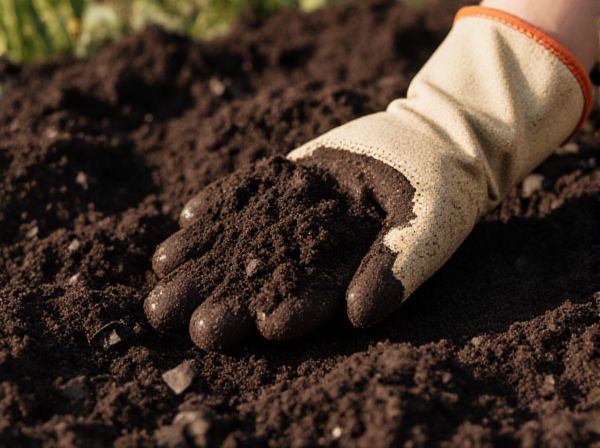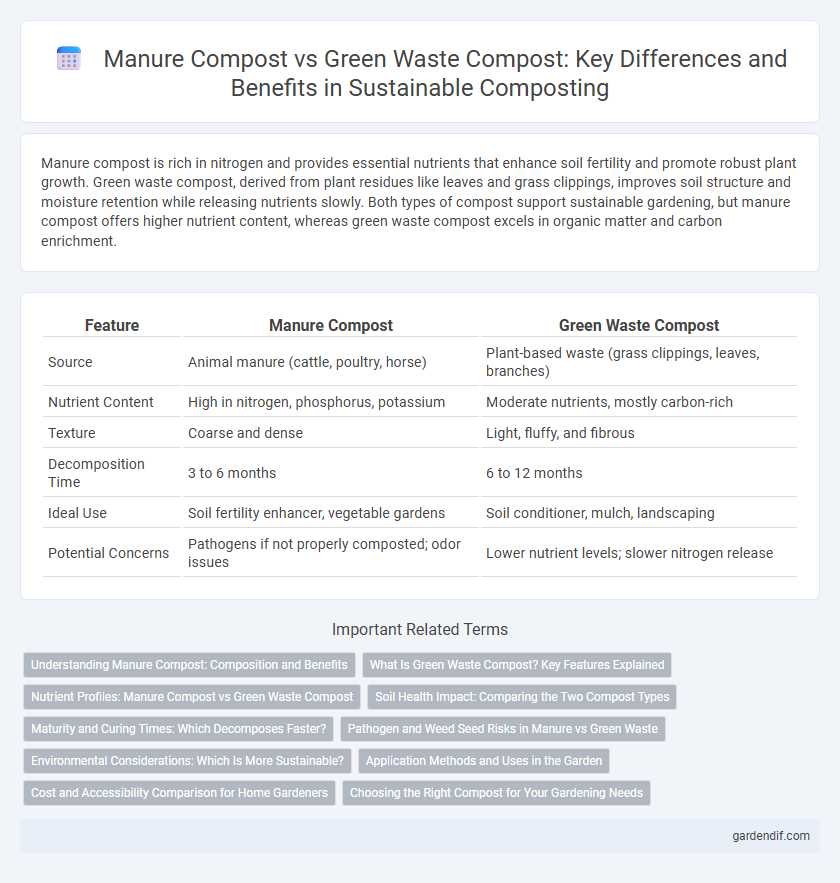
Manure compost vs Green waste compost Illustration
Manure compost is rich in nitrogen and provides essential nutrients that enhance soil fertility and promote robust plant growth. Green waste compost, derived from plant residues like leaves and grass clippings, improves soil structure and moisture retention while releasing nutrients slowly. Both types of compost support sustainable gardening, but manure compost offers higher nutrient content, whereas green waste compost excels in organic matter and carbon enrichment.
Table of Comparison
| Feature | Manure Compost | Green Waste Compost |
|---|---|---|
| Source | Animal manure (cattle, poultry, horse) | Plant-based waste (grass clippings, leaves, branches) |
| Nutrient Content | High in nitrogen, phosphorus, potassium | Moderate nutrients, mostly carbon-rich |
| Texture | Coarse and dense | Light, fluffy, and fibrous |
| Decomposition Time | 3 to 6 months | 6 to 12 months |
| Ideal Use | Soil fertility enhancer, vegetable gardens | Soil conditioner, mulch, landscaping |
| Potential Concerns | Pathogens if not properly composted; odor issues | Lower nutrient levels; slower nitrogen release |
Understanding Manure Compost: Composition and Benefits
Manure compost is rich in nitrogen, phosphorus, and potassium, essential nutrients that enhance soil fertility and promote plant growth. Its high microbial activity accelerates organic matter decomposition, improving soil structure and moisture retention. Unlike green waste compost, manure compost provides a more concentrated nutrient profile, making it ideal for boosting nutrient-deficient soils.
What Is Green Waste Compost? Key Features Explained
Green waste compost is organic material derived from garden trimmings, grass clippings, leaves, and other plant-based waste, processed through aerobic decomposition. It is rich in essential nutrients like nitrogen, phosphorus, and potassium, which enhance soil fertility and structure without the odor or potential pathogens found in manure compost. This type of compost is particularly valued for its high carbon content and ability to improve soil aeration and water retention, making it ideal for sustainable gardening and landscaping.
Nutrient Profiles: Manure Compost vs Green Waste Compost
Manure compost offers a richer nutrient profile, especially higher levels of nitrogen, phosphorus, and potassium, essential for vigorous plant growth. Green waste compost tends to have a more balanced but lower concentration of nutrients, primarily providing organic matter that improves soil structure and moisture retention. Understanding these nutrient differences helps optimize fertilizer strategies and soil amendment applications for diverse agricultural and horticultural needs.
Soil Health Impact: Comparing the Two Compost Types
Manure compost enhances soil health by boosting microbial activity and increasing nutrient availability, particularly nitrogen and phosphorus, essential for plant growth. Green waste compost improves soil structure and water retention through its high organic carbon content, promoting aeration and moisture balance. Both compost types contribute to soil fertility, but manure compost offers a more direct nutrient supply, while green waste compost excels in enhancing physical soil properties.
Maturity and Curing Times: Which Decomposes Faster?
Manure compost generally decomposes faster than green waste compost due to its higher nitrogen content and microbial activity, resulting in shorter maturity and curing times--often within 2 to 6 weeks. Green waste compost, rich in carbon and lignin, requires longer curing periods, sometimes extending to several months, to fully stabilize and become safe for use. Understanding these decomposition rates assists in selecting the appropriate compost type for timely soil amendment and nutrient availability.
Pathogen and Weed Seed Risks in Manure vs Green Waste
Manure compost carries a higher risk of pathogen contamination and weed seed survival compared to green waste compost due to its origin from animal feces and bedding material often rich in weed seeds. Proper composting temperatures above 55degC sustained for several days are crucial to effectively reduce pathogens and destroy viable weed seeds in manure compost. Green waste compost typically presents lower pathogen risks and fewer resilient weed seeds, making it safer for direct application but still requiring adequate curing to ensure weed seed mortality.
Environmental Considerations: Which Is More Sustainable?
Manure compost offers high nutrient content but poses risks of methane emissions and potential water contamination if not managed properly. Green waste compost, derived from plant-based materials, generally produces fewer greenhouse gases and supports carbon sequestration, enhancing soil health sustainably. Evaluating environmental impact, green waste compost typically presents a more sustainable option due to lower pollution potential and improved ecosystem benefits.
Application Methods and Uses in the Garden
Manure compost is rich in nitrogen and ideal for vegetable gardens and flower beds, promoting vigorous plant growth through soil enrichment; it is best applied as a top dressing or incorporated into the soil before planting. Green waste compost offers balanced nutrients and improved soil structure, making it suitable for lawns, shrubs, and general garden beds; it can be used as mulch or mixed into garden soil to enhance moisture retention and aeration. Both compost types benefit from proper curing to reduce pathogens and ensure safe application, supporting sustainable garden health.
Cost and Accessibility Comparison for Home Gardeners
Manure compost typically costs more than green waste compost due to the additional processing required to ensure safety and nutrient balance, making green waste compost a more affordable option for home gardeners. Green waste compost is widely accessible, often available through municipal recycling programs or local garden centers, whereas manure compost may be limited in availability and require sourcing from farms or specialty suppliers. Home gardeners seeking cost-effective and easily obtainable compost generally prefer green waste compost for its balance of nutrients and convenience.
Choosing the Right Compost for Your Gardening Needs
Manure compost is rich in nitrogen and essential nutrients, making it ideal for vegetable gardens and plants with high nutrient demands. Green waste compost, derived from plant residues like leaves and grass clippings, offers a balanced, slow-release nutrient source that improves soil structure and moisture retention. Selecting the right compost depends on plant type, soil condition, and nutrient requirements, ensuring optimal growth and soil health.
Manure compost vs Green waste compost Infographic

 gardendif.com
gardendif.com